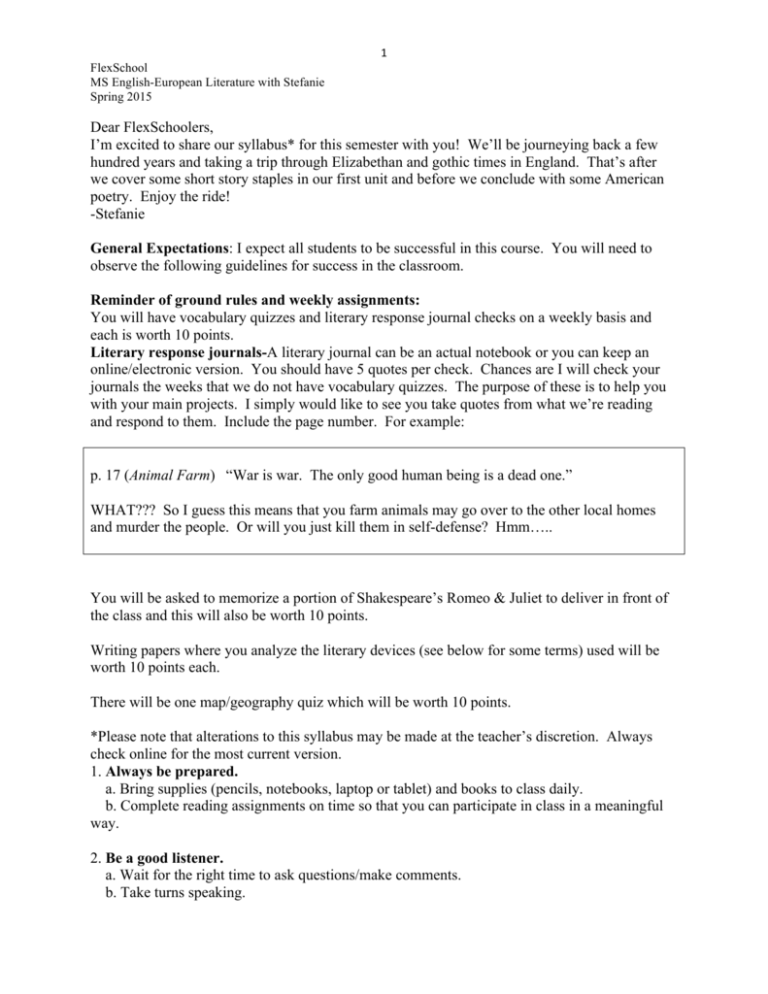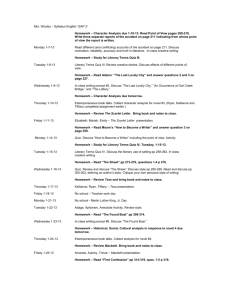Dear FlexSchoolers, I'm excited to share our syllabus* for this
advertisement

1 FlexSchool MS English-European Literature with Stefanie Spring 2015 Dear FlexSchoolers, I’m excited to share our syllabus* for this semester with you! We’ll be journeying back a few hundred years and taking a trip through Elizabethan and gothic times in England. That’s after we cover some short story staples in our first unit and before we conclude with some American poetry. Enjoy the ride! -Stefanie General Expectations: I expect all students to be successful in this course. You will need to observe the following guidelines for success in the classroom. Reminder of ground rules and weekly assignments: You will have vocabulary quizzes and literary response journal checks on a weekly basis and each is worth 10 points. Literary response journals-A literary journal can be an actual notebook or you can keep an online/electronic version. You should have 5 quotes per check. Chances are I will check your journals the weeks that we do not have vocabulary quizzes. The purpose of these is to help you with your main projects. I simply would like to see you take quotes from what we’re reading and respond to them. Include the page number. For example: p. 17 (Animal Farm) “War is war. The only good human being is a dead one.” WHAT??? So I guess this means that you farm animals may go over to the other local homes and murder the people. Or will you just kill them in self-defense? Hmm….. You will be asked to memorize a portion of Shakespeare’s Romeo & Juliet to deliver in front of the class and this will also be worth 10 points. Writing papers where you analyze the literary devices (see below for some terms) used will be worth 10 points each. There will be one map/geography quiz which will be worth 10 points. *Please note that alterations to this syllabus may be made at the teacher’s discretion. Always check online for the most current version. 1. Always be prepared. a. Bring supplies (pencils, notebooks, laptop or tablet) and books to class daily. b. Complete reading assignments on time so that you can participate in class in a meaningful way. 2. Be a good listener. a. Wait for the right time to ask questions/make comments. b. Take turns speaking. 2 FlexSchool MS English-European Literature with Stefanie Spring 2015 3. Be respectful. a. The world is full of differing opinions. Enjoy the diversity. b. Listen without interrupting. c. Use proper classroom behavior as per our policies. d. Treat school materials/property with respect. e. Use appropriate and acceptable language. 4. Work independently. A. Do your own work. It is better to make a mistake and learn from it. Mindless copying accomplishes nothing in the end. B. Keep track of your assignments. C. Find and/or contact me whenever you need assistance: stefanie@ivyed.net Here are the works we will be reading and they are divided by units: Short Stories “The Lottery” (1948) “The Fall of the House of Usher” (1839) “The Body Snatcher” (1884) “The Monkey’s Paw” (1902) Shakespeare Romeo & Juliet (1594) British & French Authors Frankenstein (1818) The Count of Monte Cristo (1888) The Adventures of Sherlock Holmes (c. 1891) The Hunchback of Notre Dame (1917) Poetry “The Mending Wall” (1916) 3 FlexSchool MS English-European Literature with Stefanie Spring 2015 Weds 2/4: Introduction Map-Identify these places: Rhine River Seine River Danube River Volga River Constantinople Jerusalem Rome Aachen Mecca Normandy Ireland Sicily Arabia Black Sea Baltic Sea Literary Terms: Alliteration Allusion Analogy Annotation Antagonist Assonance Connotative vs Denotative Meaning Consonance Figurative vs Literal Language Foreshadow Irony Metaphors Motif vs. Leitmotif Narrator Novella Omniscient Observer Point of view (1st person, 3rd person…etc.) Protagonist Rhyme Scheme Short Story Similes Symbolism Tone HW: For Friday 2/6, please read “The Lottery” and make some journal entries. 4 FlexSchool MS English-European Literature with Stefanie Spring 2015 We will discuss it on Friday. 2/6: Discuss “The Lottery” and literary elements used HW: Read “The Fall of the House of Usher” (1839) Epigraph translated: "His heart is a hanging lute;/Whenever one touches it, it resounds." ... 2/11: Discuss “The Fall…” HW: Read“The Monkey’s Paw” (1902) 2/13: Discuss “The Monkey’s Paw” HW: Read pgs. 1-6 of “The Body Snatcher” (1884), Study literary terms for a quiz on 2/18 and make sure you have 5 journal entries TOTAL from the short stories we read 2/18: Short Story Vocabulary Quiz and share journal entries. Meet again with Shakespeare HW: Read pgs. 7-13 of “The Body Snatcher,” Study literary terms for a quiz 2/20: Literary term quiz, finish discussion of short stories HW: Make sure you have 5 journal entries TOTAL from the short stories we read 2/25: Identify Vocabulary from Romeo & Juliet (1594) HW: Read Act I 2/27: Begin recitations from Romeo & Juliet HW: Read Acts II & III, Identify what you would like to memorize and recite in front of the class 3/4: Shakespeare Journal Entries Due HW: Read Acts IV & V, Study for Shakespeare Vocab Quiz 3/6: Shakespeare Vocab Quiz, HW: Read background on Mary Wollstonecraft Shelley for Frankenstein (1818) and first 4 letters from text. 3/11: Frankenstein discussion, vocabulary will be identified HW: Read chapters 1-8 in Frankenstein 3/13: Frankenstein discussion HW: Read chapters 9-17 in Frankenstein 3/18: Frankenstein discussion, vocabulary quiz HW: Read chapters 18-24 in Frankenstein and finish literary journals for it 3/20: Frankenstein literary journals due, finish discussion HW: Read Vols. 1-2 of The Count of Monte Cristo (1888) 5 FlexSchool MS English-European Literature with Stefanie Spring 2015 3/25: The Count… discussion, vocabulary will be identified HW: Read Vol. 3 of The Count… 3/27: The Count…discussion HW: Read Vol. 4 of The Count… 4/1: The Count…vocabulary quiz HW: Read Vol. 5 of The Count…and finish literary journals for it 4/3-4/10: NO CLASS; ENJOY YOUR BREAK! 4/15: The Count…journals due, finish discussion and talk about paper 4/17: Begin reading The Adventures of Sherlock Holmes (c. 1891) HW: Read chapters I-III 4/22: Identify vocabulary from Sherlock Holmes HW: Read chapters IV-VI 4/24: Discussion of Sherlock Holmes HW: Read chapters VII-IX 4/29: Vocabulary quiz for Sherlock Holmes HW: Read chapters X-XII and finish literary journals for S Sherlock Holmes 5/1: Collect Sherlock Holmes journals, work on paper 5/6: Papers due, begin discussing The Hunchback of Notre Dame (1917) HW: Read Preface and Book 1 5/8: Identify vocabulary from Hunchback HW: Read Books 2-4 5/13: Hunchback discussion HW: Read Books 5-6 5/15: Hunchback discussion HW: Read Books 7-9 5/20: Hunchback vocabulary quiz HW: Read Books 10-1, finish journals for Hunchback 5/22: NO CLASS 5/27: Collect Hunchback journals, begin poetry unit 6 FlexSchool MS English-European Literature with Stefanie Spring 2015 HW: Select a poem you would like to share with the class. Be sure to have the author’s name and date of publication available. Begin studying for map quiz. 5/29: Read “The Mending Wall” (1916). Start sharing poems HW: Study for map quiz. Think about a topic for a poem you’d like to write. 6/3: Map quiz. Finish sharing poems. HW: Write a poem. 6/5: Present written poems. Work on portfolios. HW: Continue work on portfolios and exhibitions. 6/10-6/12: Finish work on portfolios and exhibitions. Enjoy your summer!




